#Business Analysis Course
Explore tagged Tumblr posts
Text
Business Analysis in the Digital Age: Aligning Strategies with Emerging Technologies
In today’s fast-evolving digital economy, the role of business analysis has significantly transformed. Business analysts (BAs) are no longer just requirement gatherers or process modellers—they are strategic partners who align business goals with technological capabilities. As companies embrace digital transformation, the need to blend analytical thinking with emerging technologies becomes vital to achieving operational excellence and competitive advantage.
The Shift Toward Digital-Driven Analysis
A traditional business analyst course or business analysis course focused on understanding user requirements and optimising existing processes. However, the digital age demands more. Businesses now face constant disruptions from technologies like AI, IoTs, blockchain, cloud computing, and big data. As a result, business analysts must evolve into digital strategists who can evaluate technological trends, assess organisational impact, and guide decision-making at all levels.
This shift means BAs must go beyond documenting requirements—they need to predict trends, recommend solutions based on data insights, and facilitate digital change initiatives across departments.
Integrating Emerging Technologies into Business Strategy
Emerging technologies offer powerful tools to solve business problems, improve efficiency, and enhance customer experiences. Business analysts must understand how to harness these tools effectively:
Artificial Intelligence and Machine Learning: BAs can help identify use cases where AI can automate processes, personalise customer interactions, or generate predictive insights. For example, in retail, AI-driven recommendation engines can increase sales, while in healthcare, machine learning models can support diagnostic accuracy.
Big Data and Analytics: Data is the foundation of modern strategy. Business analysts must collaborate with data teams to interpret vast datasets, uncover patterns, and use dashboards or visualisation tools (like Power BI or Tableau) to support real-time decision-making.
Cloud Computing: As businesses migrate to cloud environments, analysts must assess the feasibility, risks, and benefits of cloud-based solutions. They must ensure that digital platforms are scalable, secure, and aligned with the company’s strategic roadmap.
Blockchain: In sectors like fintech and supply chain, blockchain presents new opportunities for transparency and trust. BAs play a key role in identifying process bottlenecks that blockchain can resolve and assessing regulatory or security implications.
IoT and Automation: Business analysts can assess how IoT devices can improve logistics, maintenance, or customer engagement, especially in industries like manufacturing and logistics. Automation tools like RPA (Robotic Process Automation) also benefit from BA-driven evaluation and integration.
Evolving Skills for the Digital Business Analyst
The digital transformation requires business analysts to expand their skillsets. Key competencies include:
Technical Literacy: While BAs don’t need to code, understanding the basics of APIs, databases, or cloud infrastructure is increasingly important.
Data-Driven Thinking: Analysing structured and unstructured data to inform business decisions is now a core requirement.
Agile Methodologies: Agile practices emphasise flexibility and collaboration—qualities that modern BAs must embody as they work across interdisciplinary teams.
Communication and Influence: As change agents, BAs must communicate the business value of technology to both technical and non-technical stakeholders.
Business Analysts as Strategic Leaders
In the digital age, business analysts must bridge the gap between innovation and implementation. Their role is essential in creating roadmaps that incorporate digital tools, building business cases for technology investments, and ensuring that all departments move in sync during transformation.
From fintech startups to global enterprises, companies are investing in a digitally fluent business analysis course or a business analyst course to spearhead projects that reimagine products, streamline operations, and meet customer expectations in real time.
Conclusion
The digital age has exponentially expanded the scope and impact of business analysis. By aligning strategies with emerging technologies, today’s business analysts are helping organisations navigate disruption and drive innovation. As businesses continue to adapt and thrive to technological advances, the need for agile, data-savvy, and visionary BAs will only grow—making this an exciting and vital profession for the future.
Business Name: ExcelR- Data Science, Data Analytics, Business Analyst Course Training Mumbai Address: Unit no. 302, 03rd Floor, Ashok Premises, Old Nagardas Rd, Nicolas Wadi Rd, Mogra Village, Gundavali Gaothan, Andheri E, Mumbai, Maharashtra 400069, Phone: 09108238354, Email: [email protected].
0 notes
Text
MBA in Business Analytics in Dehradun

Do you want to make data your superpower? Then pursuing an MBA in Business Analytics from Dehradun can be the best decision to bring "main character energy" to your career!
Why is Dehradun different?
Forget expensive metro cities - Dehradun offers a pocket-friendly lifestyle with quality education. Premium MBA programs, but without the hefty fees. And that mountain view during study breaks? Perfect for mental health!
What will you learn? And why it's super beneficial
This course is packed with the hottest skills in the industry today:
Machine Learning and AI (because the future is with robots, bestie!)
Data Mining and Statistical Analysis
Business Intelligence Tools (like Tableau, Power BI)
Predictive Analytics (like the science of the future!)
Digital Marketing Analytics
Career Options That Are Actually Amazing
You can become a Data Scientist, Business Intelligence Analyst, or Marketing Analytics Manager. Starting salary? ₹6-12 lakhs per annum — and it's all about growth. No caps!
The Dehradun Advantage
The class sizes are smaller, which means more personalized attention and strong networking. And the work-life balance? Trekking + assignments = perfect life.
1 note
·
View note
Text
#business analyst skills#business analyst certification#business analyst course#business analyst training#business analyst#business analyst careers#business analysis training#business analysis course#business analyst tools#business analytics institute in india#business analytics training#business analytics course#business analytics software#business analytics
0 notes
Text
Launch Your Data Career with Expert-Led Data Analyst Training Mississauga
Step into The World of Data with Data Analyst Training Mississauga by Envision Learning—your Gateway to a High-Demand, Future-Proof Career. Designed for beginners and professionals alike, this hands-on program helps you gain real-world skills in tools like SQL, Excel, Power BI, and more. Whether you’re making a career switch or enhancing your current role, this training gives you the confidence and practical experience to succeed. Located in the thriving tech and business environment of Mississauga, the program offers flexible schedules, expert mentors, and strong placement support. With live projects and industry-aligned modules, you’ll be ready to take on data-driven roles across industries. Enroll with Envision Learning and start building your data career from the ground up—right here in Mississauga. Visit https://www.envisionlearning.ca/data-analyst-training-mississauga-building-skills-for-a-data-driven-future/

#business analysis course#business analysis#data analytics#ba training#education#business analysis training
0 notes
Text
0 notes
Text

Best Digital Marketing Company in India | Digital Appersky
Best Digitial Marketing company in india. We Offer following Courier and Services
Digital Marketing
Branding Design
Social Media Marketing
Viral Marketing
Business Analysis
#digital marketing#Seo services#social media marketing#viral marketing#business analysis course#marketing services#market research
1 note
·
View note
Text

Monday CRM doesn\u2019t just offer solutions\u2014we offer your solutions. By aligning with your operational framework, we optimize workflows, integrate essential tools, and simplify processes so your team can thrive with data-backed decisions.
#it#it jobs#technology#tech#current events#technews#sierra consulting#crm benefits#crm services#crm solution#crm strategy#sales crm#crm integration#crm software#crm#techsolutions#businesssolutions#businessgrowth#itservices#businesssuccess#business growth#business partners#business tools#business analytics#small business#business analyst#business analysis course
0 notes
Text
Business Analytics for Competitive Advantage: Leveraging Data to Drive Business Strategy
In today’s data-driven world, businesses have access to an unprecedented amount of information. The challenge lies in using this data effectively to gain a competitive advantage. Business analytics has emerged as a critical tool for organizations to drive strategy, optimize performance, and stay ahead of the competition. For those looking to thrive in this evolving landscape, pursuing a Business Analyst Course or Business Analysis Course can provide the skills needed to excel in leveraging data for strategic decision-making.
1. Understanding Business Analytics
Business analytics involves the application of statistical and quantitative methods, predictive modeling, and data visualization to analyze and interpret business data. This discipline bridges the gap between raw data and actionable insights, enabling organizations to make informed decisions that align with their objectives.
2. The Role of Business Analytics in Gaining Competitive Advantage
By harnessing the power of data, organizations can achieve the following:
- Data-Driven Decision-Making: Business analytics empowers organizations to move away from intuition-based decisions and rely on evidence-backed strategies.
- Customer Insights: Analytics reveals customer preferences, behavior patterns, and purchasing trends, enabling businesses to tailor their offerings and improve customer satisfaction.
- Operational Efficiency: Businesses can identify inefficiencies in their processes and implement solutions to reduce costs and improve productivity.
- Market Positioning: By analyzing competitors and market trends, organizations can identify opportunities and position themselves more effectively.
3. Key Techniques in Business Analytics
- Descriptive Analytics: This technique focuses on analyzing historical data to understand what has happened in the past. Tools such as dashboards and reports help organizations identify patterns and trends.
- Predictive Analytics: Using statistical models and machine learning, predictive analytics forecasts future outcomes, enabling businesses to anticipate challenges and opportunities.
- Prescriptive Analytics: This advanced technique recommends specific actions to achieve desired outcomes. It combines data, algorithms, and business rules to optimize decision-making.
4. Leveraging Business Analytics to Drive Strategy
Organizations can integrate business analytics into their strategies in the following ways:
- Strategic Planning: Analytics helps identify strengths, weaknesses, opportunities, and threats (SWOT analysis) to guide long-term planning.
- Personalization: Using customer data, businesses can offer personalized experiences, fostering loyalty and increasing sales.
- Performance Measurement: Analytics provides real-time performance metrics, enabling organizations to track progress against goals and adjust strategies as needed.
- Innovation: Data-driven insights can reveal unmet customer needs, sparking innovation in products, services, and processes.
5. Upskilling with Business Analyst Courses
For professionals aspiring to lead in this data-driven era, enrolling in a Business Analyst Course or Business Analysis Course can be transformative. These courses provide essential training in analytical tools, data visualization, and problem-solving techniques. They also cover methodologies like Agile and Six Sigma, which are crucial for implementing analytics in real-world scenarios.
6. The Future of Business Analytics
As technologies like artificial intelligence (AI) and machine learning evolve, business analytics will become even more sophisticated. Businesses that invest in analytics today will be better equipped to adapt to market changes, predict customer behavior, and innovate effectively.
Conclusion
Business analytics is no longer a luxury but a necessity for competitive advantage. By leveraging data to drive business strategy, organizations can unlock new opportunities, streamline operations, and deliver unparalleled value to their customers. Professionals aiming to excel in this field can benefit greatly from specialized training through a Business Analyst Course or Business Analysis Course, ensuring they stay ahead in this data-driven age.
Business name: ExcelR- Data Science, Data Analytics, Business Analytics Course Training Mumbai
Address: 304, 3rd Floor, Pratibha Building. Three Petrol pump, Lal Bahadur Shastri Rd, opposite Manas Tower, Pakhdi, Thane West, Thane, Maharashtra 400602
Phone: 09108238354
Email: [email protected]
0 notes
Text
Business Analyst Training with Job Placement
Launch your career with Business Analyst training that includes job placement! Gain essential BA skills, real-world experience, and support to land a job, bridging you to success in the field with Transform Learning Academy.
0 notes
Text
Financial Forecasting: A Business Analyst’s Approach to Predicting Business Success
In a rapidly changing economic landscape, financial forecasting plays a crucial role in helping businesses plan for the future, allocate resources efficiently, and stay ahead of market trends. Accurate financial forecasting enables organisations to predict revenue, manage expenses, assess investment opportunities, and mitigate risks. Business analysts are central to this process, using data-driven insights and strategic thinking to create reliable financial projections. A well-designed business analyst course provides aspiring professionals with the skills and techniques needed to excel in this role and contribute meaningfully to long-term business success.
Understanding Financial Forecasting
Financial forecasting involves estimating future financial outcomes based on historical data, current trends, and expected business conditions. It typically includes projecting income, expenses, cash flow, and capital requirements over specific time periods—monthly, quarterly, or annually.
This process supports key decisions such as budgeting, staffing, pricing, and expansion planning. Forecasts can also be used to set performance benchmarks, attract investors, and prepare for economic uncertainties. The accuracy and relevance of these forecasts depend heavily on the analyst’s ability to interpret data and understand the business environment.
The Business Analyst’s Role in Financial Forecasting
A business analyst is uniquely positioned to drive financial forecasting initiatives due to their cross-functional expertise. They understand both the strategic objectives of the business and the technical tools needed to analyse data. Their responsibilities include:
Collecting and validating historical financial data
Identifying internal and external factors that impact financial performance
Building forecasting models using statistical and analytical methods
Collaborating with finance, operations, and marketing teams to align assumptions
Presenting forecasts in a way that supports executive decision-making
By connecting data insights with business strategy, analysts help leadership teams prepare for growth opportunities, navigate risks, and achieve financial stability. A business analyst course introduces learners to forecasting tools and real-world case studies that simulate these responsibilities.
Tools and Techniques Taught in Business Analyst Courses
A modern business analyst course equips students with both foundational and advanced forecasting skills. These include:
Trend analysis: Examining past performance to project future trends
Regression models: Identifying relationships between variables to predict outcomes
Scenario planning: Modelling different business scenarios to evaluate risks and opportunities
Variance analysis: Comparing forecasted results with actual outcomes to improve accuracy
Time series analysis: Leveraging patterns in chronological data for forecasting
Courses also teach software tools like Microsoft Excel, Power BI, and Python for data manipulation, visualisation, and modelling. By working with hands-on financial datasets, students gain practical experience that prepares them to contribute effectively in corporate environments.
Industry Applications of Financial Forecasting
Financial forecasting is essential across industries. In retail, forecasts inform inventory purchases and marketing budgets. In manufacturing, they guide production planning and raw material sourcing. In tech startups, they help estimate runway and funding needs. Business analysts in these environments ensure that forecasting is both data-informed and strategically aligned.
For example, a business analyst working in a logistics company might forecast transportation costs based on fuel prices, delivery volumes, and seasonal demand. In a SaaS firm, they may project recurring revenue based on churn rates, new subscriptions, and pricing models.
By tailoring forecasting models to each industry’s unique dynamics, analysts play a direct role in shaping strategic decisions and achieving financial targets.
Building Credibility Through Accuracy
Effective forecasting is not about guesswork—it’s about applying structured methodologies, making informed assumptions, and continuously refining models based on feedback. Business analysts build credibility by documenting their assumptions, validating data sources, and adjusting forecasts as new information becomes available.
A business analytics course emphasises the importance of this discipline and introduces frameworks for continuous improvement. It also trains students to communicate forecasts clearly to stakeholder from both technical and non-technical background, bridging the gap between data and decision-making.
Conclusion
Financial forecasting is a powerful tool for steering business success, and business analysts are at the heart of making it work. Their analytical mindset, combined with domain knowledge and data literacy, allows them to create forecasts that drive strategic outcomes. A business analysis course provides the training necessary to develop these capabilities, empowering professionals to guide organisations through uncertainty and toward growth. As businesses increasingly rely on foresight and agility, skilled analysts will continue to play a critical role in predicting and shaping the future.
Business Name: ExcelR- Data Science, Data Analytics, Business Analyst Course Training Mumbai Address: Unit no. 302, 03rd Floor, Ashok Premises, Old Nagardas Rd, Nicolas Wadi Rd, Mogra Village, Gundavali Gaothan, Andheri E, Mumbai, Maharashtra 400069, Phone: 09108238354, Email: [email protected].
0 notes
Text
Top Analytics Tools for Tracking Website Performance and User Engagement

In today’s digital age, understanding your website’s performance and user engagement is essential for any business. Whether you’re running an e-commerce site, a blog, or a corporate webpage, having the right analytics tools can help you gather valuable insights about your audience, their behaviors, and how they interact with your content. This blog will explore some of the top analytics tools available that can help you track website performance and improve user engagement.
Why Website Performance and User Engagement Matter
Before diving into the tools, it’s important to understand why monitoring website performance and user engagement is crucial. A well-performing website ensures that visitors can navigate easily and find the information they need without frustration. Good user engagement means visitors are interacting with your content, leading to longer session durations, lower bounce rates, and ultimately higher conversion rates.
1. Google Analytics

Overview: Google Analytics is perhaps the most popular web analytics tool available. It’s free and offers a wide range of features that help you track various metrics on your website.
Key Features:
Real-Time Tracking: See how many visitors are currently on your site and which pages they are viewing.
Audience Insights: Understand demographics, interests, and behavior patterns of your visitors.
Conversion Tracking: Set up goals to monitor how well your site converts visitors into customers.
Use Cases: Google Analytics is excellent for businesses of all sizes. Whether you’re tracking a small blog or a large e-commerce site, the insights gained can help you refine your marketing strategies and improve user experience.
2. Adobe Analytics
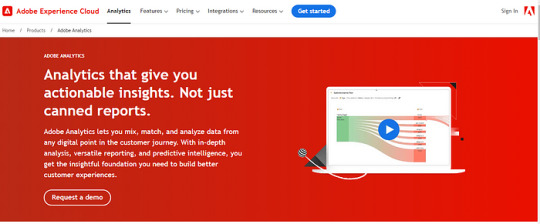
Overview: Adobe Analytics is a powerful tool primarily used by larger enterprises. It offers advanced analytics capabilities and is part of the Adobe Experience Cloud.
Key Features:
Advanced Segmentation: Divide your audience into specific groups for targeted analysis.
Predictive Analytics: Use machine learning to forecast future trends and user behavior.
Cross-Channel Tracking: Monitor user interactions across various platforms and devices.
Use Cases: Companies that run large-scale marketing campaigns benefit from Adobe Analytics, as it provides in-depth insights that help optimize campaigns and improve ROI.
3. Hotjar

Overview: Hotjar focuses on understanding user behavior through visual data. It offers unique tools like heatmaps and session recordings.
Key Features:
Heatmaps: Visual representations of where users click, scroll, and move on your site.
Session Recordings: Watch recordings of real user sessions to see how they interact with your site.
Feedback Polls: Gather direct feedback from users about their experience.
Use Cases: Hotjar is ideal for UX/UI designers and marketers looking to enhance website usability. By understanding where users struggle, you can make necessary adjustments to improve the overall experience.
4. SEMrush

Overview: SEMrush is an all-in-one marketing toolkit that also offers robust analytics features, especially for SEO.
Key Features:
Traffic Analysis: Understand where your website traffic comes from and how users behave once they arrive.
Keyword Tracking: Monitor your keyword rankings and discover new opportunities for optimization.
Competitor Analysis: Analyze your competitors’ performance and strategies to identify areas for improvement.
Use Cases: SEMrush is beneficial for digital marketers focused on SEO. By understanding your own performance as well as your competitors’, you can develop effective strategies to boost your online presence.
5. Mixpanel

Overview: Mixpanel is a user analytics platform focused on tracking user interactions with web and mobile applications.
Key Features:
Event Tracking: Monitor specific actions users take on your site, such as clicks and sign-ups.
Cohort Analysis: Segment users based on their behavior and track their engagement over time.
A/B Testing: Experiment with different versions of your website to see what resonates more with your audience.
Use Cases: Mixpanel is particularly useful for SaaS companies looking to improve user retention and engagement through data-driven insights.
6. Crazy Egg
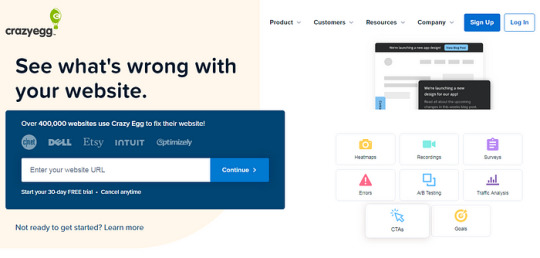
Overview: Crazy Egg provides simple yet effective tools to visualize user behavior on your website.
Key Features:
Heatmaps and Scrollmaps: Understand how users navigate your site and which sections attract the most attention.
A/B Testing Tools: Easily test different layouts and content to see what performs best.
User-Friendly Interface: Crazy Egg is straightforward to set up and use, making it accessible for beginners.
Use Cases: Ideal for startups and small businesses looking to optimize their landing pages and improve user experience without a steep learning curve.
7. Piwik PRO
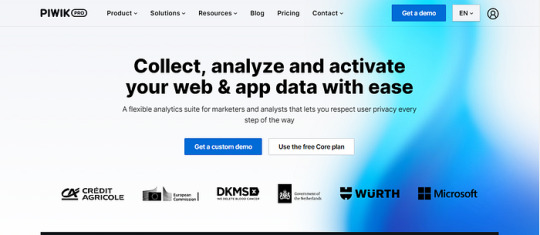
Overview: Piwik PRO offers a privacy-focused analytics solution that is great for businesses concerned about data compliance.
Key Features:
On-Premise Hosting: Gives you complete control over your data and compliance with regulations like GDPR.
Customizable Dashboards: Tailor your analytics reports to meet specific business needs.
User-Centric Tracking: Focuses on providing insights while ensuring user privacy.
Use Cases: Organizations in regulated industries, such as healthcare and finance, can benefit from Piwik PRO to ensure compliance while gaining valuable insights.
8. HubSpot Analytics
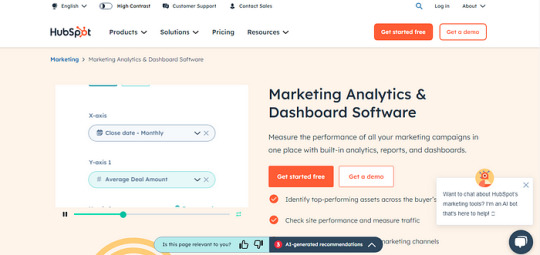
Overview: HubSpot is known for its CRM and marketing automation tools, and it also offers robust analytics features.
Key Features:
Detailed Reporting: Track website performance, user engagement, and marketing campaign effectiveness.
Traffic Sources Analysis: Understand how users are finding your site and which channels are most effective.
Integration with Marketing Tools: Easily connect your analytics with HubSpot’s CRM for a comprehensive view of customer interactions.
Use Cases: Businesses already using HubSpot for marketing will find its analytics tools seamlessly integrated, making it easy to track performance across all efforts.
9. Fab Builder Analytics
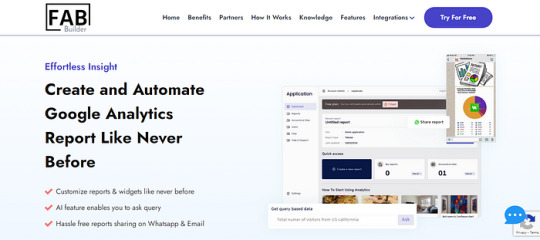
Overview: Fab Builder Analytics is a powerful data analytics and visualization tool that helps you turn your data into informative reports.
Key Features:
Custom Dashboards: Create interactive reports that pull data from multiple sources, including Google Analytics.
Real-Time Collaboration: Share dashboards and collaborate with your team in real-time.
Easy Data Integration: Connect with various data sources for comprehensive reporting.
Use Cases: Ideal for teams that need to present data insights to stakeholders in a clear and visually appealing manner.
Conclusion
Choosing the right analytics tool for tracking website performance and user engagement is crucial for driving business success. Each tool offers unique features that cater to different needs, from basic tracking to advanced predictive analytics. By leveraging these tools, you can gain valuable insights into your audience, refine your strategies, and ultimately enhance your website’s performance.
Investing in analytics tools ensures you can refine strategies, engage users effectively, and drive long-term growth. Fab Builder Analytics stands out with its customizable dashboards and easy collaboration, making it a great choice for teams presenting data insights to stakeholders.
In today’s competitive landscape, investing in the right analytics tools is not just a choice — it’s a necessity. Start exploring these options today, and see how they can transform your online presence!
#google analytics#business analytics#data analysis#website analytics#analysis#tools#business analysis course#business analyst#business data visualization#business growth
0 notes
Text
Join Envision Learning for Practical BA Course Brampton – Build Your Career with Expert BA Training in Brampton
Looking To Start your Career As a Business Analyst? Enroll in the BA Course Brampton at Envision Learning, designed to equip you with real-world skills and tools. Our BA Training in Brampton covers business process modeling, requirements gathering, Agile methodology, and hands-on case studies to help you become job-ready. Whether you're new to the field or switching careers, our program offers flexible schedules, live projects, and job placement support. Located in the heart of the GTA, Envision Learning is a trusted name for quality BA Brampton training. Learn From Industry Professionals & Prepare for Roles in IT, finance, & More. Build your future with Envision Learning Career-Focused Business Analyst Training in Brampton Today. Visit https://www.envisionlearning.ca/ba-course-brampton-envision-learning-offers-future-ready-training/

#business analysis course#data analysis#data analytics#business analysis training#business analysis#BA Course Brampton#Brampton#BA Training in Brampton
0 notes
Text
Unlock success in business analysis with key skills! Explore the essential abilities every business analyst should master for career advancement.
#business analytics#business analysis course#business analysis training#businessevolution#business listings#successful business ideas#ethics first#habilelabs
0 notes
Text
The Importance Of Organization For Your Tech Business
If you run a tech business, one of the main things you need to do is be organized. Whether you're a startup or a well-established organization, having a well-structured company can differentiate between success and failure. Organization comes in many forms, from the physical practicalities of your office to managing workflows to optimize productivity. In this article, we look at some tips on how to be more organized and keep your workplace running as efficiently as possible.

How can you be organized as a tech business?
Invest in good quality storage for your tech, such as modular enclosures
Ensure you have streamlined procedures throughout the company
Promote clear communication between you all
Utilize programs such as Slack and Microsoft Teams to speak often between yourselves.
Hold regular meetings so everyone knows what is happening
Set clear goals and ensure that these are met
Utilize automation where you can to help take care of more mundane tasks
Create a comprehensive business plan that will outline your aims and objectives
Why is organization so important for a tech business?
There are so many reasons why organization is the key. This includes:
It will streamline your operations
The first and most important thing in any business is being practical and efficient. Streamlining your operations is a great way to do this and ensure your processes are smooth and efficient. In tech companies, you'll often have multiple projects running simultaneously, which can get chaotic and confusing if you don't have a good method of keeping track of what's going on. By being organized and having a structured workflow, you can prevent a bottleneck from happening and ensure there aren't any miscommunications or deadlines that are overlooked.
It will help your employees be more productive
Tech businesses thrive off innovation and hard work, which require productive employees to do this. If your company feels chaotic, tasks aren't prioritized, nothing can be found easily, and goals aren't clearly defined, this isn't going to happen. Get everything in place, both physically and in terms of goals and criteria, and it will help your employees be more productive in no time. Invest in storage solutions such as modular enclosures that can help house all your tech and keep it neat, tidy, and simple to find. It also means if anything goes wrong, it can easily be attributed to the source, and you don't need to dig around trying to find a certain cable or computer in a mess. Speak to your employees to find out what can help them feel more productive in the workplace, whether this is their physical space or how their work is made more efficient.
It can improve the communication between everyone
In any workplace, communication can be the make or break of a company. You want employees who will work well together and get tasks done quickly and efficiently. In the tech industry, collaboration between departments such as developers, designers, marketers, and maintenance is essential, so having an organized method of getting in touch is vital. We recommend using communication channels such as Slack, Microsoft Teams, or Skype which enable effortless ways to speak to each other. You can also use Google Drive or another cloud storage to store documents and files virtually, which means they can be accessed anywhere. As a tech company, you'll know the importance of protecting this by two-factor authentication and strong passwords.
It can help you ensure your business is compliant
Compliance is crucial, and there is an ever-growing emphasis on cybersecurity. Your business needs to be compliant not only in case of any audits, so you're compliant with GDPR, HIPAA, or other country-specific regulatory bodies but also so your customers trust you. The rules and regulations are there for a reason: to keep your customers' data safe. Being properly organized means that sensitive data is stored securely, and you can rest assured breaches won't happen due to negligence and that you've done all you can to remain compliant and maintain people's trust in you and your business.
It can enable your business to scale up
Scalability is something that all businesses should focus on as it will enable your company to grow and monopolize the market. If you are disorganized, scaling efficiently and effectively can be a real struggle. Instead, you should ensure you have organized documentation, well-structured workflows, and standard operating procedures throughout your company so everything is done the same way by each person. This can help you onboard new employees to your company, expand the level of services you offer, and adapt to market changes without it being too chaotic!
It will ensure your customers are more satisfied
At the end of the day, your customers are the most important aspect of your business, so you want to do what you can to keep them happy. When you have a reliable business that runs well, and they know will offer excellent service every time without failure, you are onto a winner. If you are disorganized, lose their information, or take a long time to respond to inquiries, it will never go down well. Ensuring you are organized is a great way to maximize customer satisfaction.
As a business, it's imperative that you are organized and have your workplace running as efficiently as possible. Streamlining your operations and ensuring everything is where it should be will position your company for long-term success. You can do many things to help your business run efficiently, and it's always good to do them to put yourself in the best possible position for future success. What are some top tips you have for being organized within your business? Let us know in the comments below; we'd love to hear from you. Note: This blog originally published at AdaptiveUS.com and blog link is The Importance Of Organization For Your Tech Business About Adaptive US - Adaptive US is the World's Go to Place for IIBA certifications. We are the only institute to offer 3 guarantees - Success Guarantee, Session Run Guarantee and Money Back Guarantee. We are also the only institute to provide training and study aids for all 7 IIBA certification programs - CBAP, CCBA, ECBA, CBDA, CPOA, AAC and CCA. With 1900+ successful IIBA certifications, Adaptive US is the world's largest provider of IIBA certification training providers. Know more about us @ www.adaptiveus.com
#business analysis#business analysis training#business analysis course#businesstech#iiba certification
0 notes
Text
Business Analyst Roadmap
Introduction
The role of a business analyst (BA) is crucial in today’s data-driven world. They bridge the gap between business objectives and IT capabilities, ensuring that projects meet business goals and deliver value. This comprehensive guide provides a detailed roadmap for aspiring business analysts, covering everything from essential skills and certifications to career progression and industry insights.
Table of Contents
Introduction to Business Analysis
Understanding the Role of a Business Analyst
Essential Skills for Business Analysts
Technical Skills
Soft Skills
Educational Background and Degrees
Certifications for Business Analysts
IIBA Certifications
PMI-PBA
Other Relevant Certifications
Tools and Technologies Used by Business Analysts
Steps to Become a Business Analyst
Academic Pathways
Gaining Relevant Experience
Networking and Professional Development
Business Analysis Methodologies
Agile Methodology
Waterfall Methodology
Hybrid Approaches
Common Challenges and Solutions for Business Analysts
Industry-Specific Business Analysis
IT and Software
Finance
Healthcare
Retail
Career Progression for Business Analysts
Salary Expectations and Job Market
Expert Insights
Conclusion
Understanding the Role of a Business Analyst
Business analysts (BAs) are responsible for analyzing an organization’s business processes and identifying opportunities for improvement. They act as a liaison between stakeholders to understand their needs and translate these requirements into actionable IT projects.
Essential Skills for Business Analysts
Technical Skills
Data Analysis: Proficiency in analyzing data and interpreting results.
Requirement Gathering: Ability to collect and document business requirements.
Business Process Modeling: Skills in creating detailed process flows using tools like BPMN.
Technical Writing: Crafting clear and concise documentation.
Software Proficiency: Knowledge of tools like SQL, Excel, and business analysis software.
Soft Skills
Communication: Strong verbal and written communication abilities.
Problem-Solving: Aptitude for identifying problems and devising effective solutions.
Critical Thinking: Ability to analyze and evaluate information objectively.
Interpersonal Skills: Building relationships with stakeholders and team members.
Negotiation: Finding common ground between conflicting interests.
Educational Background and Degrees
A bachelor’s degree in business administration, finance, information technology, or a related field is typically required. Some roles may prefer candidates with a master’s degree in business administration (MBA) or a related discipline.
Certifications for Business Analysts
IIBA Certifications
The International Institute of Business Analysis (IIBA) offers various certifications:
ECBA (Entry Certificate in Business Analysis)
CCBA (Certification of Capability in Business Analysis)
CBAP (Certified Business Analysis Professional)
CBATL (Certified Business Analysis Thought Leader)
PMI-PBA
The Project Management Institute (PMI) offers the PMI Professional in Business Analysis (PMI-PBA) certification, which is highly regarded in the industry.
Other Relevant Certifications
Certifications such as Six Sigma, Lean, and Agile (CSM, SAFe) can also be valuable for business analysts.
Tools and Technologies Used by Business Analysts
Business analysts use a variety of tools and technologies to perform their duties effectively:
Microsoft Excel: For data analysis and reporting.
SQL: For database querying and data manipulation.
Business Analysis Software: Tools like Jira, Confluence, and Trello for project management and collaboration.
BPM Tools: Business Process Model and Notation (BPMN) tools for process modeling.
Visualization Tools: Power BI, Tableau for data visualization and reporting.
Steps to Become a Business Analyst
Academic Pathways
Start with a relevant bachelor’s degree, followed by acquiring certifications that enhance your qualifications.
Gaining Relevant Experience
Seek internships or entry-level positions that provide exposure to business analysis tasks. Volunteering for projects within your organization can also be beneficial.
Networking and Professional Development
Join professional organizations like IIBA, attend conferences, and participate in workshops to build a network and stay updated with industry trends.
Business Analysis Methodologies
Agile Methodology

Waterfall Methodology
A linear approach where each phase of the project must be completed before moving to the next. Suitable for projects with well-defined requirements.
Hybrid Approaches
Combining elements of both Agile and Waterfall to suit the specific needs of the project.
Common Challenges and Solutions for Business Analysts
Ambiguous Requirements: Use techniques like workshops and interviews to clarify requirements.
Stakeholder Conflicts: Mediate and facilitate discussions to reach a consensus.
Changing Requirements: Implement change management processes to handle requirement changes effectively.
Industry-Specific Business Analysis
IT and Software
Focus on requirements gathering, software development lifecycle, and user experience design.
Finance
Emphasizes regulatory compliance, risk management, and financial reporting.
Healthcare
Involves understanding healthcare regulations, patient data management, and electronic health records (EHR) systems.
Retail
Focuses on supply chain management, customer relationship management (CRM), and point-of-sale (POS) systems.
Career Progression for Business Analysts
Starting as a junior BA, one can progress to senior BA, lead BA, and eventually to roles like product manager, project manager, or business architect.
Salary Expectations and Job Market
Business analysts are in high demand across various industries. Salaries vary based on experience, location, and industry but generally range from $60,000 to $120,000 per year.
Expert Insights
Quotes and advice from seasoned business analysts and industry experts can provide valuable insights into the profession.
Conclusion
The roadmap to becoming a successful business analyst involves a combination of education, skills development, certification, and practical experience. By following this comprehensive guide, aspiring business analysts can navigate their career path effectively and achieve their professional goals.
what are the best ways to learn Business analyst course? We run a training institute in Hyderabad named PMP Academy. We do offer best Business Analyst coaching in Hyderabad with job assistance. Now when you list the best ways to learn Business Analyst coaching in Hyderabad include PMP Academy Business Analyst course as one of the way.
#business analyst#businessanalysis#business analysis course#business analytics#business analysis training
0 notes
Text
Why a Business Analyst Course Can Boost Your Career Prospects
In today’s competitive business world, the demand for skilled business analysts is growing across various industries. As companies strive to enhance efficiency, cut costs, and stay ahead of competitors, the role of a business analyst (BA) has become crucial. If you’re considering a career in this field, a business analyst course or business analysis course can significantly enhance your career prospects. Here’s why investing in such a course is a smart move:
1. High Demand for Skilled Business Analysts
Business analysts help organizations make data-driven decisions, improve processes, and achieve business objectives. This skill set is increasingly in demand across sectors like finance, healthcare, IT, and e-commerce. A well-rounded business analysis course equips you with the essential tools and techniques required in the industry, positioning you as a valuable asset to potential employers.
2. Structured Learning and Skill Development
A formal business analyst course offers structured learning, breaking down complex concepts into manageable segments. You’ll learn core business analysis skills such as data gathering, requirement elicitation, process modeling, and stakeholder management. These skills form the foundation of business analysis, allowing you to tackle real-world challenges effectively. Courses often incorporate hands-on projects, case studies, and simulations, making the learning process both practical and relevant.
3. Certification Advantage
Earning a certification from a reputable business analyst course adds weight to your resume. Certification demonstrates to employers that you possess the necessary knowledge, skills, and commitment to succeed in business analysis. This can make you a preferred candidate for BA roles, as companies often seek certified professionals for critical projects. Recognized certifications, like those from the International Institute of Business Analysis (IIBA), can even open doors to higher-level positions and specialized roles.
4. Mastery of Modern Tools and Techniques
Business analysts use a variety of tools, from Excel and SQL for data analysis to software like JIRA for project management and BPMN for process modeling. A business analysis course introduces you to these tools and techniques, enabling you to analyze data, map business processes, and manage projects efficiently. Familiarity with such tools also shows potential employers that you’re ready to work with the industry-standard technology, making you a competitive candidate.
5. Improved Problem-Solving and Analytical Skills
Business analysis is all about identifying and solving problems. Through a business analyst course, you’ll learn how to approach challenges analytically, dissecting problems to find root causes and designing actionable solutions. This skill is invaluable across industries and can lead to improved performance, faster promotions, and more significant responsibilities in your career.
6. Expands Networking Opportunities
Joining a business analysis course often means connecting with industry experts, experienced instructors, and fellow students from diverse backgrounds. Networking with peers and mentors can provide insights into the industry, open doors for collaboration, and help you stay updated with the latest trends. These connections may also lead to job opportunities and partnerships, expanding your career possibilities.
7. Adaptability and Career Flexibility
Business analysis skills are highly transferable, which means they’re applicable across industries and roles. With a business analyst course, you gain a versatile skill set that allows you to pivot between sectors, from finance to tech, or even government. The demand for business analysts in various domains ensures that you have the flexibility to explore new fields while maintaining a steady career path.
Conclusion
Pursuing a business analyst course or business analysis course offers a range of benefits, from acquiring in-demand skills and certification to expanding your professional network. The structured learning, combined with practical skills and networking opportunities, makes it a valuable investment in your career. For those looking to make a meaningful impact and accelerate their career growth, a business analyst course is an excellent step forward in today’s competitive job market.
Business name: ExcelR- Data Science, Data Analytics, Business Analytics Course Training Mumbai
Address: 304, 3rd Floor, Pratibha Building. Three Petrol pump, Lal Bahadur Shastri Rd, opposite Manas Tower, Pakhdi, Thane West, Thane, Maharashtra 400602
Phone: 09108238354
Email: [email protected]
0 notes